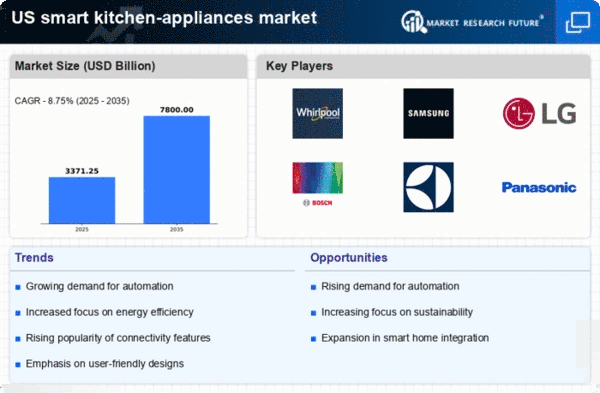Technological Advancements in IoT
Technological advancements in the Internet of Things (IoT) play a pivotal role in the evolution of the smart kitchen-appliances market. The proliferation of connected devices enables seamless communication between appliances, enhancing functionality and user experience. For instance, smart refrigerators can monitor food inventory and suggest recipes based on available ingredients. The market is witnessing a significant increase in IoT-enabled appliances, with an estimated 60% of new kitchen appliances incorporating smart technology. This trend not only improves efficiency but also allows for remote monitoring and control, appealing to tech-savvy consumers. As IoT technology continues to advance, it is expected to drive further growth in the smart kitchen-appliances market, fostering innovation and enhancing consumer engagement.
Rising Consumer Demand for Convenience
The smart kitchen-appliances market experiences a notable surge in consumer demand for convenience-driven solutions. As lifestyles become increasingly hectic, consumers seek appliances that simplify cooking and food preparation. This trend is reflected in the growing adoption of smart ovens, refrigerators, and dishwashers that offer remote control and automation features. According to recent data, the market is projected to grow at a CAGR of 15% over the next five years, driven by the desire for time-saving technologies. The integration of voice-activated assistants and mobile applications further enhances user experience, making it easier for consumers to manage their kitchen tasks. This shift towards convenience is likely to continue shaping the smart kitchen-appliances market, as manufacturers innovate to meet evolving consumer preferences.
Sustainability and Eco-Friendly Solutions
Sustainability concerns are increasingly influencing consumer choices in the smart kitchen-appliances market. As awareness of environmental issues grows, consumers are gravitating towards energy-efficient appliances that reduce carbon footprints. Smart appliances equipped with energy monitoring features allow users to track and optimize their energy consumption, aligning with eco-friendly practices. The market for energy-efficient appliances is projected to reach $10 billion by 2027, reflecting a shift towards sustainable living. Manufacturers are responding by developing products that not only meet energy standards but also incorporate recyclable materials. This focus on sustainability is likely to resonate with environmentally conscious consumers, driving demand for smart kitchen appliances that contribute to a greener future.
Growing Popularity of Smart Home Ecosystems
The growing popularity of smart home ecosystems significantly impacts the smart kitchen-appliances market. As consumers increasingly invest in interconnected home technologies, the demand for kitchen appliances that seamlessly integrate with existing smart home systems rises. This trend is evidenced by the increasing number of appliances compatible with platforms such as Amazon Alexa and Google Assistant. Approximately 55% of households in the US now own at least one smart home device, creating a fertile ground for the adoption of smart kitchen appliances. The ability to control kitchen devices through a central hub enhances convenience and user experience, making it an attractive proposition for consumers. This integration is expected to drive further growth in the smart kitchen-appliances market, as manufacturers focus on compatibility and interoperability.
Integration of Health and Wellness Features
The integration of health and wellness features into kitchen appliances is emerging as a key driver in the smart kitchen-appliances market. Consumers are increasingly prioritizing health-conscious cooking, leading to a demand for appliances that facilitate healthier meal preparation. Smart ovens and cookers now offer features such as calorie tracking and nutritional information, catering to the health-focused consumer. Market Research Future indicates that approximately 40% of consumers are willing to pay a premium for appliances that promote healthier cooking options. This trend reflects a broader societal shift towards wellness, with smart kitchen appliances playing a crucial role in supporting healthier lifestyles. As this focus on health continues, the market is likely to see further innovations aimed at enhancing the cooking experience.
.png)
















